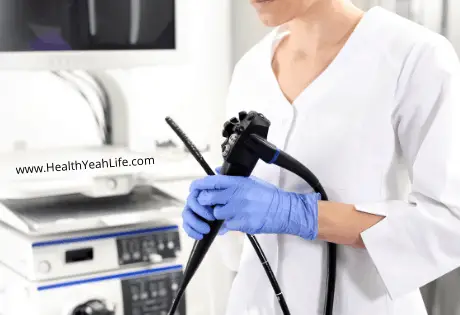March is Colon Cancer Awareness Month
Avoiding a colonoscopy? Having colon cancer is scarier, then going through screening. There are more enjoyable things to think of doing then have a colonoscopy. But when you think of the alternative, it isn’t that bad. The third leading cause of cancer-related deaths in the U.S. can be detected and prevented with a simple test …
and just one day of slight discomfort.
Here are a few tips on what to expect when having a colonoscopy.

When should a person have a colonoscopy? There are a few guidelines from the American Cancer Society. They recommend both men and women have screenings at the age of 45. And, your doctor may not suggest a colonoscopy until the age of 50. Remember that it depends on your risk factor, i.e., family history. My doctor has said that he believes they will start suggesting colonoscopies at the age of 40. Early detection is vital. Colorectal cancer is the third most common cancer diagnosed in both men and women in the United States.
Not everyone feels they “need” to have a colonoscopy; after all, it is embarrassing, time-consuming and can be costly. Anyone in good health should have regular colorectal cancer screenings through the age of 75. For those who are ages 76 through 85, deciding on screenings should be determined by overall health and prior screening history. As we continue to progress into living a longer life, I suggest screenings as long as your doctor will allow. It is recommended to no longer screen for colon cancer after the age of 85 due to health risks that may incur.
For screening, people are considered to be at average risk if they do not have:
- A personal history of colorectal cancer or certain types of polyps
- A family history of colorectal cancer
- A personal history of inflammatory bowel disease (ulcerative colitis or Crohn’s disease)
- A confirmed or suspected hereditary colorectal cancer syndrome, such as familial adenomatous polyposis (FAP) or Lynch syndrome (hereditary non-polyposis colon cancer or HNPCC)
- A personal history of getting radiation to the abdomen (belly) or pelvic area to treat a prior cancer
Anyone who is considered high risk for having colon cancer should not only start screenings at an earlier age but may need to be screened more often. This includes people with:
- A strong family history of colorectal cancer or certain types of polyps
- A personal history of colorectal cancer or certain types of polyps
- A personal history of inflammatory bowel disease (ulcerative colitis or Crohn’s disease)
- A known family history of a hereditary colorectal cancer syndrome such as familial adenomatous polyposis (FAP) or Lynch syndrome (also known as hereditary non-polyposis colon cancer or HNPCC)
- A personal history of radiation to the abdomen (belly) or pelvic area to treat a prior cancer
Preparing for a colonoscopy is relatively easy. A few days before your procedure, you will want to eliminate all fibrous foods. Do not eat things like nuts, whole grains, seeds, raw fruits or vegetables, or dried fruit. The day before your procedure, you will not eat any solid foods. Only consume clear liquids like broth, apple juice, clear soft drinks or sports drinks, jello, etc. And, on the day of your procedure, you will want to follow your doctor's guidelines and nothing by mouth 2 hours before the procedure. This includes mints and gum.
You will need to do a bowel prep that will start the afternoon or evening before your scheduled colonoscopy. Your doctor will supply you with a liquid that will clear your bowels. Yes, it will cause you to have diarrhea. You need to have your bowels completely cleared out for a successful colonoscopy. If not, the doctor may be unable to see polyps or lesions, or the procedure could take longer.
Some valuable prep tips are:
- Make sure to receive your colonoscopy prep instructions and read through the material well before your scheduled colonoscopy. If you have any questions or concerns, contact your doctor's office so that they can help guide you.
- You may want to pick up some medicated wipes such as Tucks or some flushable wipes to soothe your rectum. You will be experiencing some burning from having frequent diarrhea. You can also use Vaseline or Desitin to soothe your surrounding skin.
- Clear your calendar for doing your prep. Stay at home while doing your prep, you will need to be close to a toilet in case of frequent eliminations.
- You may wish to wear loose and comfortable clothing. The prep may cause you to become somewhat bloated.
- Make sure you consider the time for the prep. You will need to follow all instructions for the prep to be successful.
- Have a variety of clear liquids for your prep. Water may be fine for part of the time, but to keep yourself from getting bored or hungry, you will want some different options. Things like coffee (without milk or creamer,) tea, clear broth, clear sodas, Gatorade, jello etc. Do not drink anything with purple, red, or blue dye. And make sure to drink plenty of fluids before, during, and after your bowel prep (following instructions.) This includes after your colonoscopy.
- Suggestions for the prescribed laxatives. Add it to clear sports drinks. Drink it chilled. Use a straw for drinking it more quickly. Take a sip of something afterward like apple juice.
You will want your bowel movements to become clear. If they are not clear, then the doctor may not be able to do the procedure, and you will have to reschedule your colonoscopy, which means doing the prep again.
Make sure to speak to your doctor about taking any prescription medicines or vitamins/supplements the days before and while doing your prep. They will guide you on what is safe.
The screening will typically take 2-3 hours, which includes check-in, the procedure, and recovery time. Your doctor will discuss anything like polyps they have removed after your procedure is completed.
Remember, on the day of your procedure; you will need to have a responsible adult drive you to and from the hospital. It is also best if they can stay with you for 2 hours afterward. You will be sedated for the procedure. If any polyps or tissue was removed, you may have bleeding for up to 2 weeks. Any polyps removed will be sent in to be biopsied, and your doctor will contact you with the results. Make sure to contact your doctor if there is significant bleeding, a fever, severe stomach pain, or any other issues.
I encourage everyone to schedule their colonoscopies today; it is the first step to detecting and preventing cancer. The overall death rate from colon cancer has dropped in recent years, primarily due to screening tests. Do yourself a favor by scheduling your colonoscopy!




